The Slave Went Free Stood a Brief Moment in the Sun Then Moved Back Again Toward Slavery
The quotes below were chosen by the 2019 cohort of Du Bois Center graduate and post-doctoral fellows.
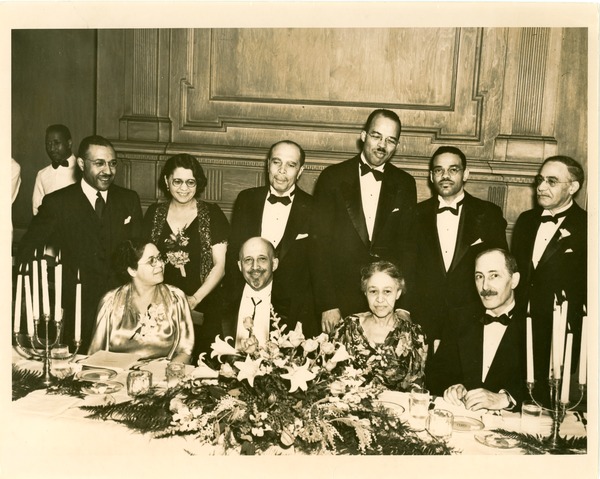
Group portrait of Du Bois and friends and family at his 70th birthday celebration at Atlanta University, 1938.
Du Bois Center Fellows Favorite Du Bois Quotes
"Between me and the other world there is ever an unasked question: unasked by some through feelings of delicacy; by others through the difficulty of rightly framing it. All, nevertheless, flutter round it. They approach me in a half-hesitant sort of way, eye me curiously or compassionately, and then, instead of saying directly, How does it feel to be a problem? they say, I know an excellent colored man in my town; or, I fought at Mechanicsville; or, Do not these Southern outrages make your blood boil? At these I smile, or am interested, or reduce the boiling to a simmer, as the occasion may inquire. To the real question, How does it feel to be a problem? I answer seldom a word."
W. E. B. Du Boisin The Souls of Black Folk(1903)
Chosen by Jay Cephas, Assistant Professor of Architecture and Urbanism at Northeastern University and 2019 Du Bois Center Post-Doctoral Fellow
"You are not and yet you are: your thoughts, your deeds, above all your dreams still live."
W. E. B. Du Bois in The Autobiography of W. E. B. Du Bois(1968)
Chosen by Freeden Blume Oeur, Associate Professor of Sociology and Education at Tufts University and 2019 Du Bois Center Post-Doctoral Fellow
"We say easily, for instance, 'The ignorant ought not to vote.' We would say, 'No civilized state should have citizens too ignorant to participate in government,' and this statement is but a step to the fact: that no state is civilized which has citizens too ignorant to help rule it."
W. E. B. Du Bois in Of the Ruling of Men (1920)
Chosen by Adam Dahl, Assistant Professor of Political Science at UMass Amherst and 2019 Du Bois Center Post-Doctoral Fellow
"The slave went free; stood a brief moment in the sun; then moved back again toward slavery."
W. E. B. Du Bois in Black Reconstruction in America (1935)
Chosen by Alexandria Russell, Post-Doctoral Fellow in the Department of History at Rutgers University and 2019 Du Bois Center Post-Doctoral Fellow
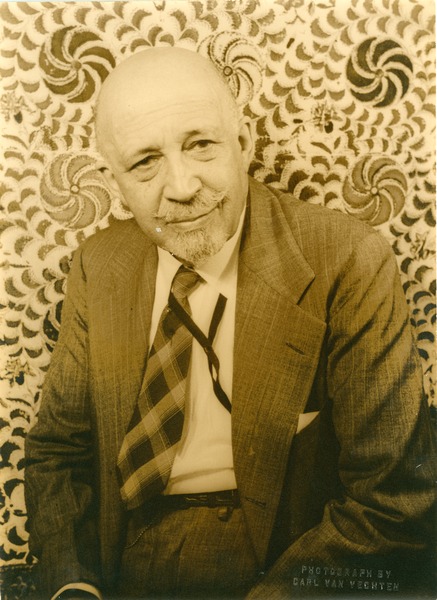
"Children learn more from what you are than what you teach."
W. E. B. Du Bois
Chosen by Victoria I. Rizo Lenshyn, German and Scandinavian Studies, University of Massachusetts Amherst and 2019 Du Bois Center Post-Doctoral Fellow
"Reader of dead words who would live deeds, this is the flowering of my logic: I dream of a world of infinitive and valuable variety; not in the laws of gravity or atomic weights, but in human variety in height and weight, color and skin, hair and nose and lip. But more especially and far above and beyond this, is a realm of true freedom: in thought and dream, fantasy and imagination; in gift, aptitude, and genius—all possible manner of difference, topped with freedom of soul to do and be, and freedom of thought to give to a world and build into it, all wealth of inborn individuality. Each effort to stop this freedom of being is a blow at democracy—that real democracy which is reservoir and opportunity . . . There can be no perfect democracy curtailed by color, race, or poverty. But with all we accomplish all, even Peace."
W. E. B. Du Bois in The World and Africa: An Inquiry into the Part Which Africa Has Played in World History (Oxford University Press, 2007 [1947]), 165.
Chosen by Phillip Sinitiere, Professor of History at the College of Biblical Studies, Houston, TX and 2019 Du Bois Center Post-Doctoral Fellow
"Perhaps even higher than strength and art loom human sympathy and sacrifice as characteristic of Negro womanhood"
W. E. B. Du Bois in The Damnation of Women (1920)
Chosen by Sarah Holm Tanzi, 2019 Du Bois Center Post-Doctoral Fellow
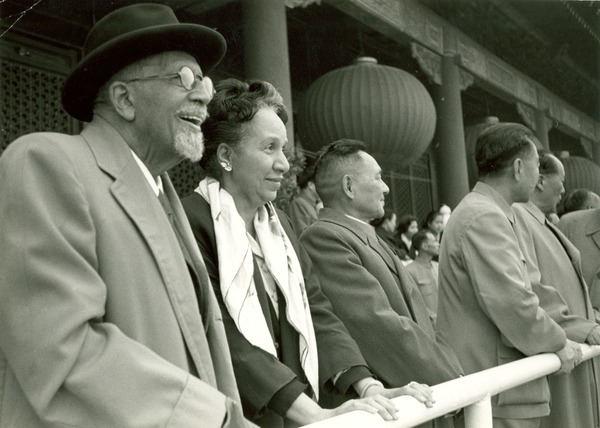
Viewing anniversary parade from balcony of ancient Royal Palace in Peking, Oct. 1, 1962.
"Nations reel and stagger on their way; they make hideous mistakes; they commit frightful wrongs; they do great and beautiful things. And shall we not best guide humanity by telling the truth about all this, so far as the truth is ascertainable?"
W. E. B. Du Boisin Black Reconstruction in America (1935)
Chosen by Eliza Araújo, Visiting Scholar at UMass AFROAm Department, Ph.D student at Universidade Federal da Paraíba, and 2019 Du Bois Center Graduate Fellow
"But what of Black women?… I most sincerely doubt if any other race of women could have brought its fineness up through so devilish a fire."
W. E. B. Du Bois
Chosen by Venus Green, Doctoral student in Sociology at UMass Amherst and 2019 Du Bois Center Graduate Fellow
"Beneath the Veil lay right and wrong, vengeance and love, and sometimes throwing aside the veil, a soul of sweet Beauty and Truth stood revealed."
W. E. B. Du Bois in Black Reconstruction in America (1935)
Chosen by Aaron Yates, Doctoral student in Sociology at UMass Amherst and 2019 Du Bois Center Graduate Fellow
"I believe in pride of race and lineage and self; in pride of self so deep as to scorn injustice to other selves."
W. E. B. Du Bois
Chosen by Samantha Davis, Doctoral student in Political Science at UMass Amherst and 2019 Du Bois Center Graduate Fellow
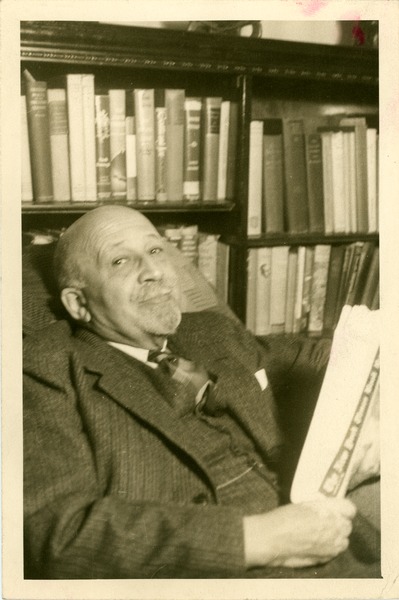
Portrait of W. E. B. Du Bois seated in study holding newspaper.
"The true significance of slavery in the United States to the whole social development of America lay in the ultimate relation of slaves to democracy. What were to be the limits of democratic control in the United States? If all labor, black as well as white, became free – were given schools and the right to vote – what control could or should be set to the power and action of these laborers? Was the rule of the mass of Americans to be unlimited, and the right to rule extended to all men regardless of race and color, or if not, what power of dictatorship and control; and how would property and privilege be protected? This was the great and primary question which was in the minds of the men who wrote the Constitution of the United States and continued in the minds of thinkers down through the slavery controversy. It still remains with the world as the problem of democracy expands and touches all races and nations."
W. E. B. Du Boisin Black Reconstruction in America (1935)
Chosen by Mike Jirik, Ph.D. Candidate in the Department of History at UMass and 2019 Du Bois Center Graduate Fellow
Rule-following, legal precedence, and political consistency are not more important than right, justice and plain common-sense.
W. E. B. Du Bois in Black Reconstruction (1935)
"And herein lies the tragedy of the age: not that men are poor, –all men know something of poverty; not that men are wicked, –who is good? not that men are ignorant, –what is Truth? Nay, but that men know so little of men."
W. E. B. Du Bois in The Souls of Black Folk(1903)
Chosen by Stacie Klinowski, Doctoral student in the English Department at UMass Amherst and 2019 Du Bois Center Graduate Fellow
"Now is the accepted time, not tomorrow, not some more convenient season. It is today that our best work can be done and not some future day or future year."
W. E. B. Du Bois
Chosen by Heather Brinn, Ph.D Candidate in the History Department at UMass Amherst and 2019 Du Bois Center Graduate Fellow
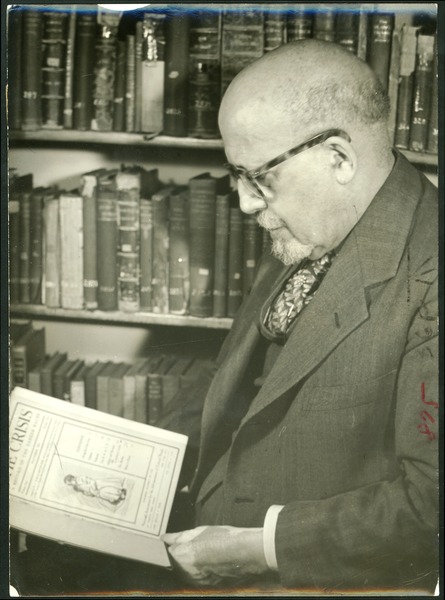
W. E. B. Du Bois in his office holding the first issue of The Crisis.
"The return from your work must be the satisfaction which that work brings you and the world's need of that work. With this, life is heaven, or as near heaven as you can get."
W. E. B. Du Bois
Chosen by Khaleelah Harris, Master of Divinity student at Yale Divinity School and 2019 Du Bois Center Graduate Fellow
"But one thing is sure and that is the fact that since the fifteenth century these ancestors of mine and their other descendants have had a common history; have suffered a common disaster and have one long memory. The actual ties of heritage between the individuals of this group, vary with the ancestors that they have in common and many others: Europeans and Semites, perhaps Mongolians, certainly American Indians. But the physical bond is least and the badge of color relatively unimportant save as a badge; the real essence of this kinship is its social heritage of slavery; the discrimination and insult; and this heritage binds together not simply the children of Africa, but extends through yellow Asia and into the South Seas. It is this unity that draws me to Africa."
W. E. B. Du Bois in Dusk of Dawn(1940)
Chosen by Swati Birla, Historical Sociologist at UMass Amherst and 2019 Du Bois Center Graduate Fellow
"Crucified on the vast wheel of time, I flew round and round with the Zeitgeist, waving my pen and lifting faint voices to explain, expound and exhort; to see, foresee and prophesy, to the few who could or would listen."
W. E. B. Du Bois
Chosen by Jingjing Zhang, Visiting Scholar in W.E.B Department of Afro-American Studies at UMass Amherst and 2019 Du Bois Center Graduate Fellow
The Slave Went Free Stood a Brief Moment in the Sun Then Moved Back Again Toward Slavery
Source: http://duboiscenter.library.umass.edu/du-bois-quotes/